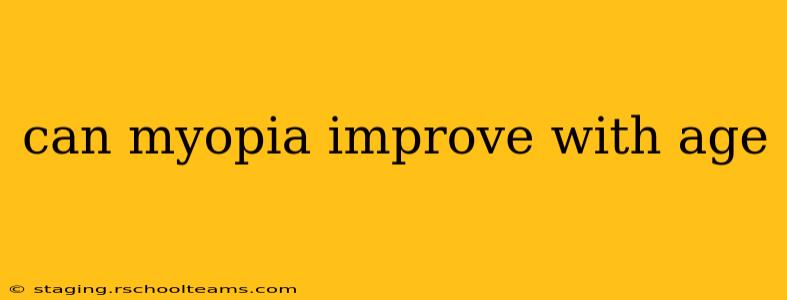Myopia, or nearsightedness, is a common refractive error where distant objects appear blurry. While it's generally understood that myopia develops during childhood and adolescence, many wonder: can myopia improve with age? The answer is complex and depends on several factors. While true improvement (meaning a significant reduction in myopia) is rare after the late twenties, the rate of progression often slows, and in some cases, stabilization occurs. Let's delve deeper into this nuanced topic.
What Causes Myopia?
Understanding myopia's causes is crucial to understanding its potential for improvement or stabilization. The exact etiology is still being researched, but several factors play significant roles:
- Genetics: A strong family history of myopia significantly increases the risk of developing it. Genetic predisposition contributes heavily to the onset and severity of myopia.
- Environmental Factors: Near-work activities, such as prolonged reading, computer use, and close-up tasks, are strongly linked to myopia development, especially in children. Lack of time spent outdoors is also considered a major contributing factor.
- Axial Length: Myopia is primarily caused by an elongation of the eyeball's axial length (the distance between the cornea and retina). This elongation causes light to focus in front of the retina instead of directly on it, resulting in blurred distance vision.
Does Myopia Get Better With Age?
While it's uncommon for myopia to significantly improve with age, the rate of progression typically slows down in early adulthood. Most cases stabilize in the late twenties to early thirties. This stabilization means the axial length of the eye stops elongating, resulting in a plateau in myopia severity. However, it’s important to remember this doesn't mean the myopia disappears entirely; it simply means the degree of nearsightedness doesn't worsen significantly.
At What Age Does Myopia Stop Progressing?
The age at which myopia progression stops varies greatly among individuals. While the majority experience stabilization in their late twenties or early thirties, some might see continued progression into their forties. Genetic predisposition, lifestyle factors, and environmental influences all contribute to the variability in progression patterns. Regular eye examinations are crucial for monitoring changes and ensuring appropriate management.
Can Myopia Worsen in Adulthood?
While rare, myopia can worsen in adulthood, particularly due to certain conditions or lifestyle changes. Pathological myopia, a severe form of myopia, can progress throughout adulthood and potentially lead to serious eye complications. Furthermore, significant changes in near-work habits or underlying health conditions could contribute to a worsening of myopia in some individuals.
What Are the Treatments for Myopia?
While myopia improvement is unlikely after stabilization, several treatments aim to manage and slow its progression, especially in children and young adults. These include:
- Eyeglasses or Contact Lenses: These correct refractive errors, providing clear vision.
- Orthokeratology (Ortho-k): Special contact lenses worn overnight gently reshape the cornea, reducing daytime myopia.
- Atropine Eye Drops: Low-dose atropine has shown promise in slowing myopia progression in children.
- Multifocal Contact Lenses: These lenses can help manage myopia progression in children and adolescents.
Conclusion: Managing Myopia Throughout Life
While it's unlikely that myopia will significantly improve with age, understanding the factors that influence its progression is vital. Regular eye exams, coupled with appropriate management strategies like corrective lenses or other treatments, are essential for maintaining good vision and preventing potential complications. While complete reversal of myopia is rare, stabilization is common, offering a reassuring outlook for those with nearsightedness. Maintaining a healthy lifestyle and regular eye care are paramount in managing myopia throughout life.
